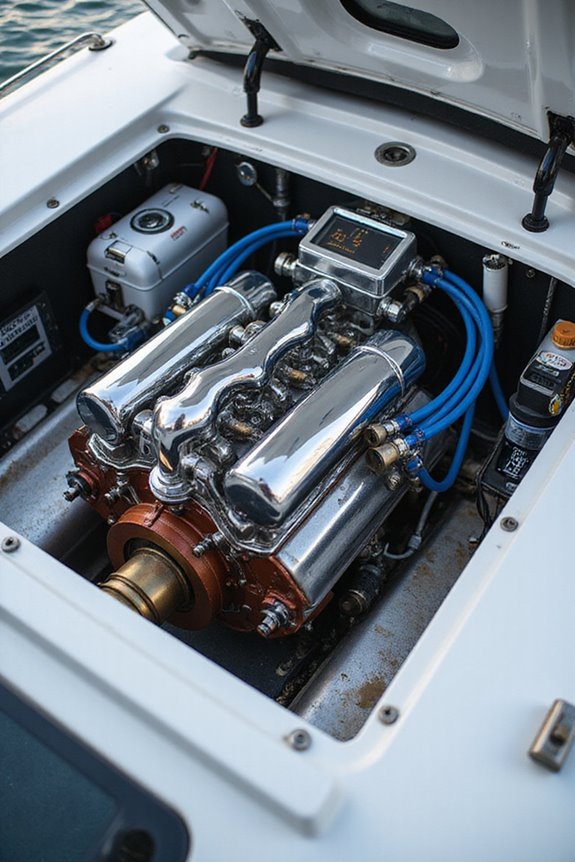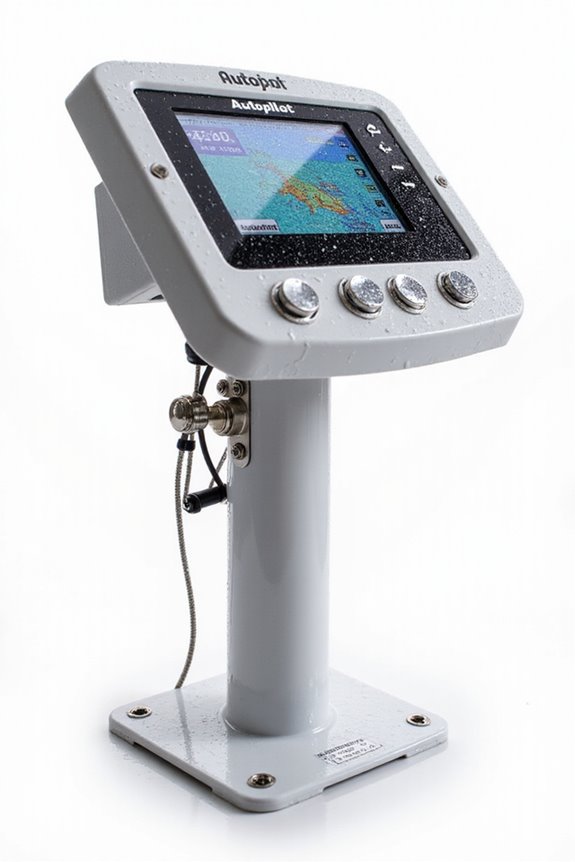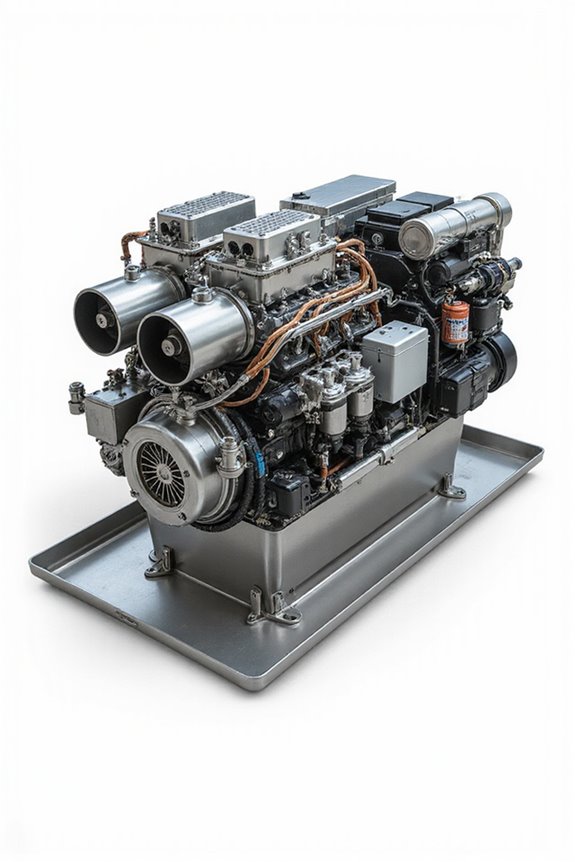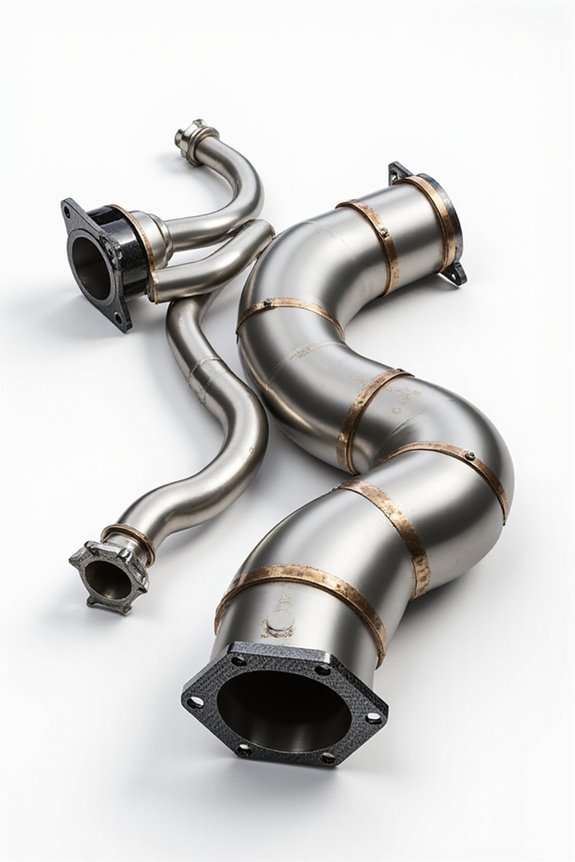If we want to get the most from our yacht engines, it’s all about balancing power, fuel efficiency, and solid maintenance. Upgrading turbochargers or tuning the engine’s fuel delivery can boost performance without frying the system. Smart voyage planning and cruising at moderate speeds help save fuel, while regular oil changes and cooling checks keep things running smoothly. Curious how hybrid systems or retrofitting might fit your boat? Stick around, and you’ll discover some exciting options ahead.
Key Takeaways
- Optimize turbocharger performance with upgraded cooling and boost control for increased engine power and reliability.
- Use advanced engine tuning to adjust fuel delivery and ignition timing, enhancing horsepower and fuel efficiency.
- Implement smart voyage planning and moderate cruising speeds to maximize fuel economy during trips.
- Maintain engines regularly, including timely oil changes and system inspections, to ensure peak performance and longevity.
- Consider hybrid propulsion or retrofit kits for cleaner, quieter operation and improved environmental compliance.
Understanding Different Types of Yacht Engines
Ever wondered what really sets different yacht engines apart? Well, let’s explore the basics together. Inboard engines sit snugly inside the hull, packing serious horsepower and torque—perfect for larger vessels and watersports lovers. Outboard engines, on the other hand, hang outside, offering versatility and efficiency ideal for smaller boats. Then we’ve got sterndrive engines, a clever blend of inboard power and outboard agility. Jet drive? It propels and steers using water, great for shallow spots without the worry of exposed blades. Diesel engines dominate bigger yachts, chosen by top engine manufacturers for their robust performance. Choosing the right engine configuration and fuel options affects everything from engine performance to maintenance. So, picking wisely means smoother sailing and fewer headaches—sounds like a win-win, right?
Enhancing Power With Turbocharger Optimization
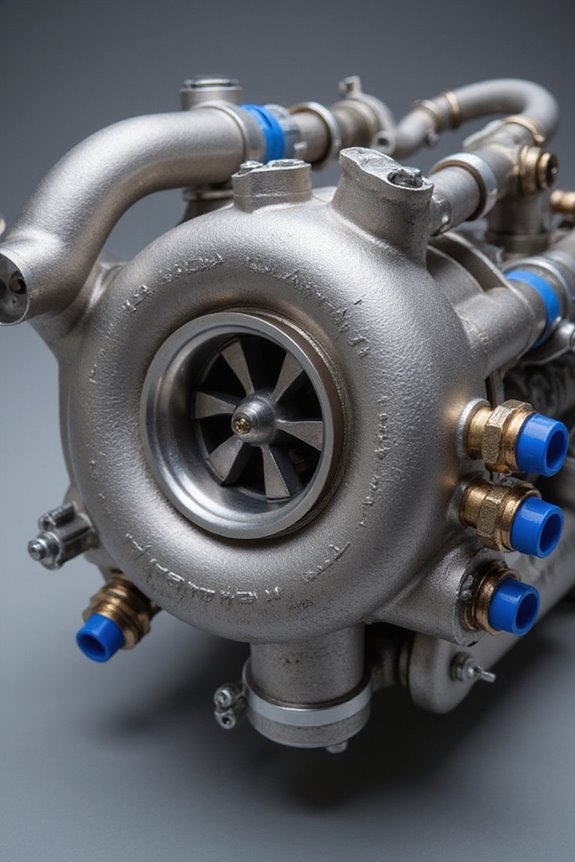
Although turbochargers might sound like high-tech magic, they’re actually practical tools that can seriously boost your yacht engine’s power by pushing more air into the combustion chamber. Together, we can explore turbocharger upgrades—like Vband or water-cooled options—that let us safely crank up boost levels without stressing the engine. But here’s the trick: boost control is key. Adjusting it precisely helps us hit the sweet spot between power and reliability. Ever wonder how to keep things running cool? Upgrading cooling systems is a must, since turbochargers generate extra heat when working hard. Plus, regular maintenance keeps everything humming. So, with the right upgrades and savvy boost management, we can release impressive performance gains—and keep our engines happy while doing it.
Fuel Efficiency Techniques for Extended Voyages
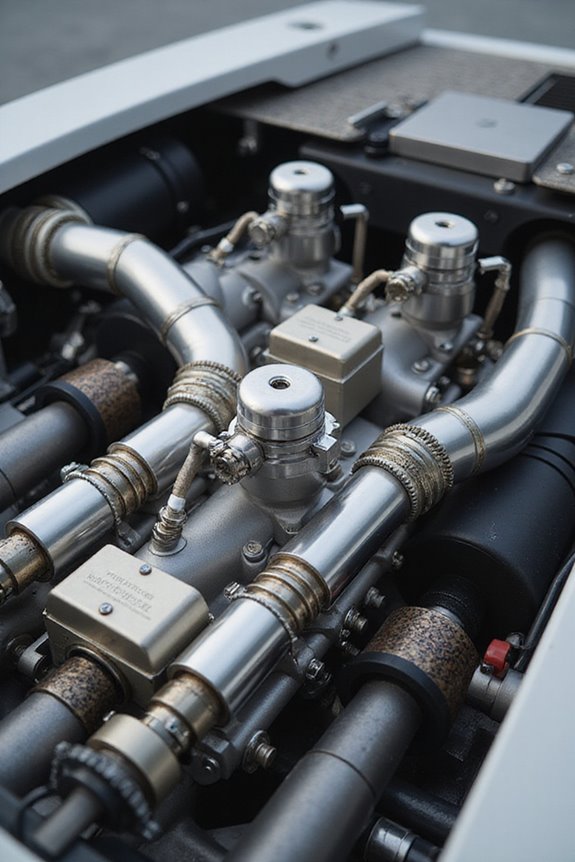
Since fueling up can eat a big chunk of our voyage budget, it’s smart to focus on fuel efficiency techniques that stretch every drop. One of our best fuel saving strategies is smart voyage planning—mapping routes that take advantage of favorable winds and currents, while avoiding choppy seas that make the engine work overtime. Ever thought about timing your departure with a weather window? It pays off, helping save precious fuel and keeping the trip smoother. Plus, cruising at moderate speeds, around 8 to 12 knots, really optimizes our engines’ appetite. Don’t forget to keep an eye on real-time ocean data and tidal patterns; adjusting our path accordingly can shave off fuel costs. After all, every nautical mile counts when we’re aiming for adventure without breaking the bank.
Essential Engine Maintenance Practices
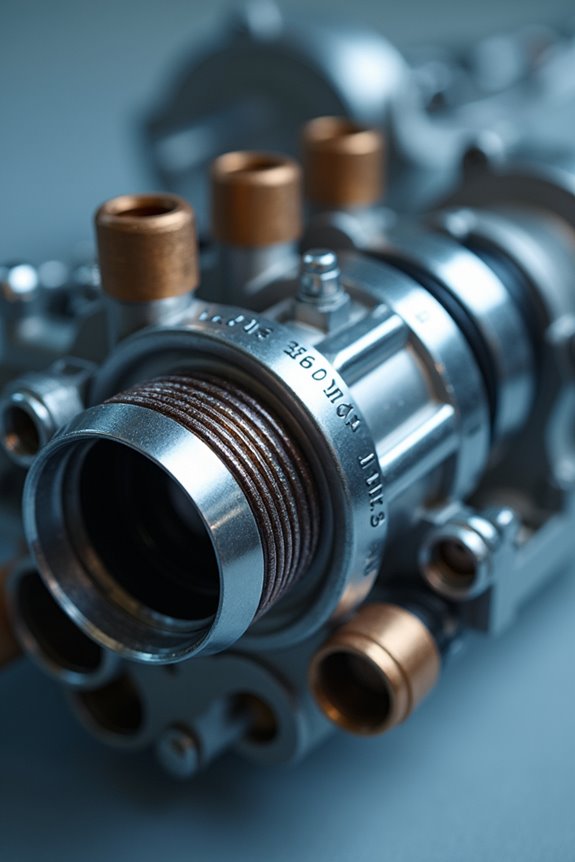
Fuel efficiency is a lifesaver on long voyages, but keeping our yacht engines in top shape is what really keeps those savings rolling. To guarantee engine reliability, sticking to maintenance schedules is non-negotiable. Regular inspections help us spot leaks or wear before they escalate, while timely oil changes every 100 hours keep corrosion and overheating at bay. Don’t forget proper lubrication—high-quality marine oil is our engine’s best friend. Cooling system checks and filter replacements also play critical roles, especially in salty waters where corrosion likes to sneak in. We’ve all been there—neglecting a propeller inspection only to pay later in lost performance. Following these essential maintenance practices keeps our engines humming smoothly, helping us avoid hiccups that could turn a perfect day into a “remember when” story. So, ready to give your engine the care it deserves?
Advanced Engine Tuning for Performance Gains
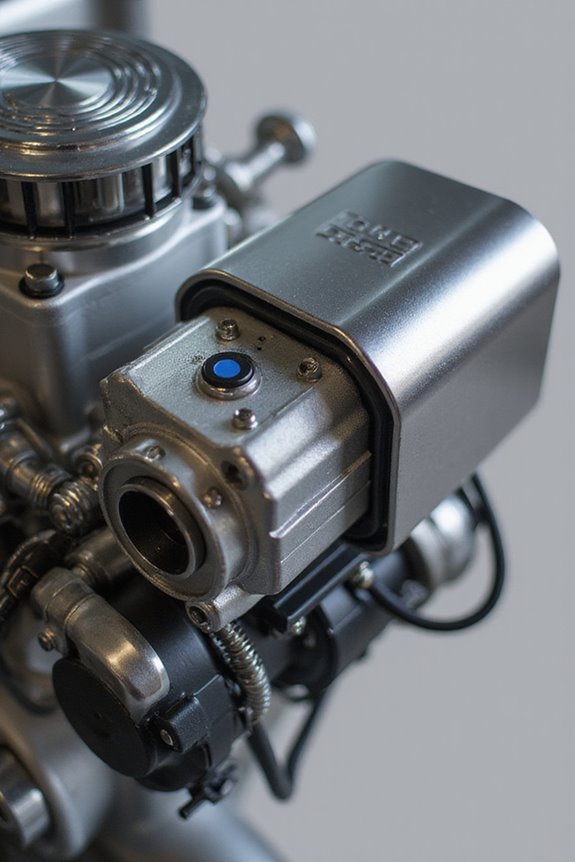
When we’re talking about squeezing every bit of power and efficiency from our yacht engines, advanced tuning can feel a bit like revealing hidden treasures under the hood. Custom tuning lets us tailor performance mapping specifically for marine conditions, optimizing fuel delivery and ignition timing to boost horsepower and torque. It’s not just about power—this precision also means smoother running and better fuel economy, which we all appreciate on long voyages. Ever wonder how some yachts seem to glide effortlessly? That’s often the result of expert performance mapping, balancing engine demands and protecting components from stress. While it might sound complex, professional custom tuning systems use smart software designed for each engine model. So, by embracing these tweaks, we guarantee our engines run strong and efficient—ready for any sea adventure.
Machine Shop Modifications: What You Need to Know
Although machine shop modifications might sound like something for car geeks alone, they’re actually an essential step in getting the absolute best from our yacht engines. Think of the machine shop as a high-tech workshop where precision machining transforms custom components to fit perfectly and perform reliably in marine applications. Using CNC technology, skilled technicians handle valve machining, cylinder honing, and engine balancing with incredible accuracy. This isn’t just about flashy upgrades; airflow optimization and durability enhancements come from careful performance testing and refining every part. Whether it’s a camshaft profile or a crankshaft balance, these tweaks guarantee smoother runs and longer engine life. Ready to trust your engine to experts who know the ropes? Machine shop mods are where science meets art—without a boring moment.
Managing Engine Load for Optimal Efficiency
After tweaking every engine part in the machine shop, the next puzzle is figuring out how to keep your yacht engine running just right under different loads. Managing engine load isn’t just a tech term; it’s about balancing torque management to avoid overloading that sneaky culprit behind wear and poor performance. Ever wondered why a too-large propeller or heavy seas make your engine sweat? That’s load at work, pushing torque beyond comfort. Keeping an eye on gearbox ratios, prop pitch, and vessel weight helps us match power demand with capacity. Regularly monitoring engine speed and load means smoother sailing and longer engine life. So, don’t just push the throttle—let’s manage that load smartly, ensuring our yacht runs efficiently and stays seaworthy for many voyages.
Tailoring Engine Performance to Yacht Specifications
Because every yacht has its own personality, tailoring engine performance to match its specific size, design, and needs is essential for getting the most out of your ride. We understand yacht specifications like hull type and displacement directly influence the ideal engine power—too big, and you risk mechanical stress; too small, and speed suffers. Ever wondered why your engine’s torque curve matters? It guarantees efficiency by matching cruising RPMs, saving fuel and improving responsiveness. Plus, weight distribution affects handling, so tuning must consider this balance. Don’t forget fuel type and injection systems—injection timing and spray patterns are key for power and emissions control tailored to your yacht’s specs. So, customizing engine performance isn’t just smart—it’s the secret sauce to smoother, more efficient voyages for all of us passionate about yachting.
Monitoring and Diagnosing Engine Performance
Customizing engine performance is just the first step in making sure your yacht runs beautifully, but keeping an eye on how it’s actually performing day-to-day is where the real magic happens. With engine diagnostics and performance analytics, we can monitor key parameters like temperature, fuel use, and even vibrations to catch issues before they become costly headaches. Ever wonder if there’s a smarter way to watch over your engine? Using advanced sensors and real-time data visualization, we get alerts the moment something’s off, so we don’t miss a beat. Plus, analyzing trends helps schedule maintenance proactively, extending your engine’s life. It’s like giving your yacht a health checkup while you enjoy the open water—with less downtime and more peace of mind.
Emerging Technologies Shaping Yacht Engine Future
While yacht engines have come a long way, the future is shaping up to be even more exciting with emerging technologies that promise cleaner, smarter, and more efficient boating. Hybrid propulsion is leading the charge by blending traditional engines with electric motors, letting us enjoy silent, emission-free cruising—sounds like a dream, right? Plus, retrofit kits make it easy to upgrade older engines without buying new boats. We’re also seeing a rise in alternative fuels like LNG, methanol, and even hydrogen, which cut emissions and help us stay ahead of regulations. Solar integration and smart power management systems optimize energy use, boosting efficiency without sacrificing performance. So, if we want to keep cruising responsibly and smartly, embracing these innovations isn’t just good—it’s necessary. Ready to join the future of yachting?
Frequently Asked Questions
How Do Sea Water Conditions Affect Yacht Engine Cooling Efficiency?
It is understood that sea temperature and salinity levels play big roles in cooling efficiency. Warmer water and higher salinity reduce heat transfer, so together we must monitor these conditions to keep our yacht engines running smoothly and prevent overheating.
What Are the Impacts of Hull Design on Engine Performance?
When we consider engine performance, hull shape plays an essential role in drag reduction, which affects power needs. Together, let’s choose designs that balance speed and efficiency to get the most from our yacht’s engine performance.
Can Engine Noise Reduction Methods Affect Performance?
We believe engine soundproofing and vibration dampening won’t hurt performance if done right. When we combine proper materials and good ventilation, we create a quieter, more comfortable experience without sacrificing engine power or efficiency.
How Does Crew Training Influence Engine Handling and Longevity?
We can’t stress enough how crew drills turn us into engine-handling superheroes, ensuring flawless engine maintenance. Together, this training bonds us, boosting confidence and extending engine life, making every voyage safer and smoother for all aboard.
What Are the Insurance Considerations for Modified Yacht Engines?
It is essential to recognize that modifying yacht engines must be disclosed to insurers to avoid coverage gaps. Insurance policies adjust based on risk assessment, reflecting added value and hazards. Let’s stay transparent and guarantee our upgrades are properly covered together.

